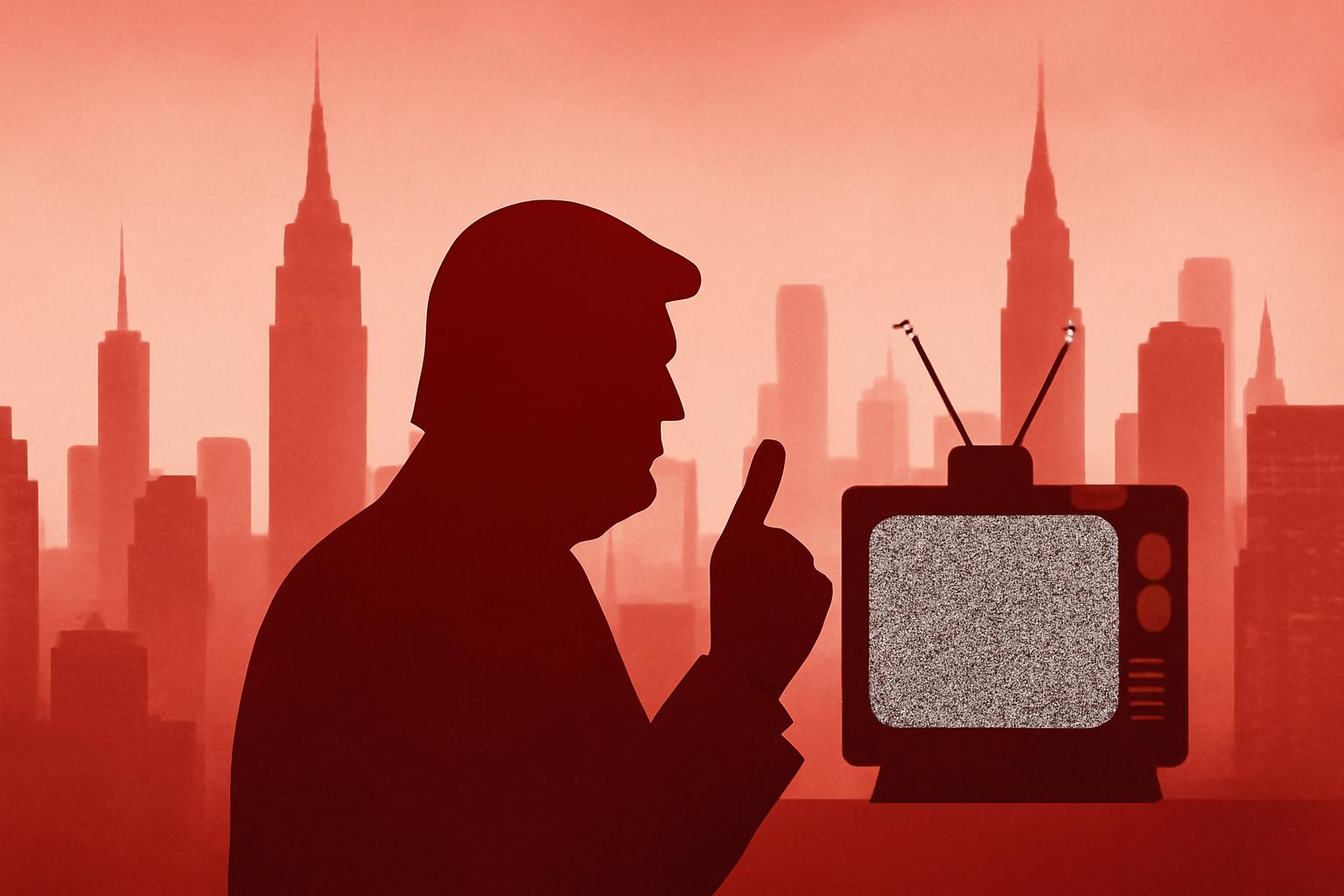“Last week, Jimmy Kimmel was taken off the air after the government threatened a private company with retaliation, marking a dark moment for freedom of speech in our nation,” the letter stated.
The letter condemned government intimidation tactics against journalists, entertainers, and artists, emphasizing that such actions contradict the foundational values and constitutional guarantees of the United States.
FinOracleAI — Market View
The suspension of “Jimmy Kimmel Live!” and the ensuing political fallout highlight significant tensions between corporate media, government influence, and the principles of free speech. Zohran Mamdani’s withdrawal from the town hall reflects growing political risks for media companies caught in the crossfire of partisan disputes and regulatory pressures.
- Opportunities: Political candidates can leverage free speech debates to galvanize support among progressive voters concerned about media censorship.
- Risks: Media companies face reputational damage and potential regulatory scrutiny, complicating content decisions amid polarized political climates.
- Industry Impact: Increased government pressure on broadcasters may chill editorial independence and affect advertising revenues.
- Public Perception: Public trust in media institutions may erode further if perceived as yielding to political or corporate pressures.
Impact: This episode underscores the fragile balance between media freedom and political influence, with implications for regulatory policy, corporate governance, and electoral politics in major U.S. cities.
In response to the suspension, the American Civil Liberties Union organized a letter signed by over 400 prominent figures in Hollywood, including Academy Award winners Robert DeNiro, Jane Fonda, Meryl Streep, and Frances McDormand.
“Last week, Jimmy Kimmel was taken off the air after the government threatened a private company with retaliation, marking a dark moment for freedom of speech in our nation,” the letter stated.
The letter condemned government intimidation tactics against journalists, entertainers, and artists, emphasizing that such actions contradict the foundational values and constitutional guarantees of the United States.
FinOracleAI — Market View
The suspension of “Jimmy Kimmel Live!” and the ensuing political fallout highlight significant tensions between corporate media, government influence, and the principles of free speech. Zohran Mamdani’s withdrawal from the town hall reflects growing political risks for media companies caught in the crossfire of partisan disputes and regulatory pressures.
- Opportunities: Political candidates can leverage free speech debates to galvanize support among progressive voters concerned about media censorship.
- Risks: Media companies face reputational damage and potential regulatory scrutiny, complicating content decisions amid polarized political climates.
- Industry Impact: Increased government pressure on broadcasters may chill editorial independence and affect advertising revenues.
- Public Perception: Public trust in media institutions may erode further if perceived as yielding to political or corporate pressures.
Impact: This episode underscores the fragile balance between media freedom and political influence, with implications for regulatory policy, corporate governance, and electoral politics in major U.S. cities.
The White House responded dismissively to Mamdani’s withdrawal, with a spokesperson calling him “the Little Communist” and accusing him of avoiding live TV debates on his policies. Mamdani identifies as a democratic socialist, rejecting the communist label.
Meanwhile, former New York Governor Andrew Cuomo and current Mayor Eric Adams, both running as independents against Mamdani, faced criticism. Cuomo’s campaign spokesperson labeled ABC’s suspension of Kimmel a mistake but criticized Mamdani’s refusal to engage with local reporters over the network’s corporate decisions.
ACLU and Hollywood Figures Rally Behind Kimmel
In response to the suspension, the American Civil Liberties Union organized a letter signed by over 400 prominent figures in Hollywood, including Academy Award winners Robert DeNiro, Jane Fonda, Meryl Streep, and Frances McDormand.
“Last week, Jimmy Kimmel was taken off the air after the government threatened a private company with retaliation, marking a dark moment for freedom of speech in our nation,” the letter stated.
The letter condemned government intimidation tactics against journalists, entertainers, and artists, emphasizing that such actions contradict the foundational values and constitutional guarantees of the United States.
FinOracleAI — Market View
The suspension of “Jimmy Kimmel Live!” and the ensuing political fallout highlight significant tensions between corporate media, government influence, and the principles of free speech. Zohran Mamdani’s withdrawal from the town hall reflects growing political risks for media companies caught in the crossfire of partisan disputes and regulatory pressures.
- Opportunities: Political candidates can leverage free speech debates to galvanize support among progressive voters concerned about media censorship.
- Risks: Media companies face reputational damage and potential regulatory scrutiny, complicating content decisions amid polarized political climates.
- Industry Impact: Increased government pressure on broadcasters may chill editorial independence and affect advertising revenues.
- Public Perception: Public trust in media institutions may erode further if perceived as yielding to political or corporate pressures.
Impact: This episode underscores the fragile balance between media freedom and political influence, with implications for regulatory policy, corporate governance, and electoral politics in major U.S. cities.
Mamdani underscored the broader impact of the suspension on the show’s production staff, including engineers, writers, and musicians, highlighting the attack on the creative community in New York City.
He further warned that the message sent to Americans nationwide is that the First Amendment is no longer a guaranteed right but rather subject to government control over permissible speech.
Political Responses and Criticism
The White House responded dismissively to Mamdani’s withdrawal, with a spokesperson calling him “the Little Communist” and accusing him of avoiding live TV debates on his policies. Mamdani identifies as a democratic socialist, rejecting the communist label.
Meanwhile, former New York Governor Andrew Cuomo and current Mayor Eric Adams, both running as independents against Mamdani, faced criticism. Cuomo’s campaign spokesperson labeled ABC’s suspension of Kimmel a mistake but criticized Mamdani’s refusal to engage with local reporters over the network’s corporate decisions.
ACLU and Hollywood Figures Rally Behind Kimmel
In response to the suspension, the American Civil Liberties Union organized a letter signed by over 400 prominent figures in Hollywood, including Academy Award winners Robert DeNiro, Jane Fonda, Meryl Streep, and Frances McDormand.
“Last week, Jimmy Kimmel was taken off the air after the government threatened a private company with retaliation, marking a dark moment for freedom of speech in our nation,” the letter stated.
The letter condemned government intimidation tactics against journalists, entertainers, and artists, emphasizing that such actions contradict the foundational values and constitutional guarantees of the United States.
FinOracleAI — Market View
The suspension of “Jimmy Kimmel Live!” and the ensuing political fallout highlight significant tensions between corporate media, government influence, and the principles of free speech. Zohran Mamdani’s withdrawal from the town hall reflects growing political risks for media companies caught in the crossfire of partisan disputes and regulatory pressures.
- Opportunities: Political candidates can leverage free speech debates to galvanize support among progressive voters concerned about media censorship.
- Risks: Media companies face reputational damage and potential regulatory scrutiny, complicating content decisions amid polarized political climates.
- Industry Impact: Increased government pressure on broadcasters may chill editorial independence and affect advertising revenues.
- Public Perception: Public trust in media institutions may erode further if perceived as yielding to political or corporate pressures.
Impact: This episode underscores the fragile balance between media freedom and political influence, with implications for regulatory policy, corporate governance, and electoral politics in major U.S. cities.
NYC Mayoral Front-Runner Withdraws from ABC Town Hall Over Jimmy Kimmel Suspension
Zohran Mamdani, the leading Democratic candidate for mayor of New York City, announced on Monday his decision to cancel a scheduled town hall event with ABC’s local affiliate. The withdrawal is a protest against the network’s indefinite suspension of the late-night talk show “Jimmy Kimmel Live!” following political pressure from the Trump administration.
At a campaign event on Manhattan’s Roosevelt Island, Mamdani emphasized that his decision targeted the corporate leadership of ABC’s parent company rather than the local journalists. He accused these corporate leaders of prioritizing profits over the essential responsibility to uphold press freedom.
Context Behind Kimmel’s Suspension
ABC announced last week that “Jimmy Kimmel Live!” would be taken off the air indefinitely after Nexstar Media Group, which operates several ABC-affiliated stations, declared it would not broadcast the show for the foreseeable future. This move came in response to Kimmel’s remarks linking the killer of conservative activist Charlie Kirk to the MAGA movement.
The suspension followed comments from Federal Communications Commission Chairman Brendan Carr, who suggested potential regulatory action against ABC over Kimmel’s statements. Disney, ABC’s corporate parent, has not disclosed when or if the show will return.
“We cannot understand this moment of authoritarianism as solely coming from the White House, when it is also characterized by the cowardice of those in response to it — the cowardice that we have seen typified whether by the parent company of ABC or by so-called leaders like Andrew Cuomo and Eric Adams looking to the White House for their path to their future ambition,” Mamdani stated.
Mamdani underscored the broader impact of the suspension on the show’s production staff, including engineers, writers, and musicians, highlighting the attack on the creative community in New York City.
He further warned that the message sent to Americans nationwide is that the First Amendment is no longer a guaranteed right but rather subject to government control over permissible speech.
Political Responses and Criticism
The White House responded dismissively to Mamdani’s withdrawal, with a spokesperson calling him “the Little Communist” and accusing him of avoiding live TV debates on his policies. Mamdani identifies as a democratic socialist, rejecting the communist label.
Meanwhile, former New York Governor Andrew Cuomo and current Mayor Eric Adams, both running as independents against Mamdani, faced criticism. Cuomo’s campaign spokesperson labeled ABC’s suspension of Kimmel a mistake but criticized Mamdani’s refusal to engage with local reporters over the network’s corporate decisions.
ACLU and Hollywood Figures Rally Behind Kimmel
In response to the suspension, the American Civil Liberties Union organized a letter signed by over 400 prominent figures in Hollywood, including Academy Award winners Robert DeNiro, Jane Fonda, Meryl Streep, and Frances McDormand.
“Last week, Jimmy Kimmel was taken off the air after the government threatened a private company with retaliation, marking a dark moment for freedom of speech in our nation,” the letter stated.
The letter condemned government intimidation tactics against journalists, entertainers, and artists, emphasizing that such actions contradict the foundational values and constitutional guarantees of the United States.
FinOracleAI — Market View
The suspension of “Jimmy Kimmel Live!” and the ensuing political fallout highlight significant tensions between corporate media, government influence, and the principles of free speech. Zohran Mamdani’s withdrawal from the town hall reflects growing political risks for media companies caught in the crossfire of partisan disputes and regulatory pressures.
- Opportunities: Political candidates can leverage free speech debates to galvanize support among progressive voters concerned about media censorship.
- Risks: Media companies face reputational damage and potential regulatory scrutiny, complicating content decisions amid polarized political climates.
- Industry Impact: Increased government pressure on broadcasters may chill editorial independence and affect advertising revenues.
- Public Perception: Public trust in media institutions may erode further if perceived as yielding to political or corporate pressures.
Impact: This episode underscores the fragile balance between media freedom and political influence, with implications for regulatory policy, corporate governance, and electoral politics in major U.S. cities.













